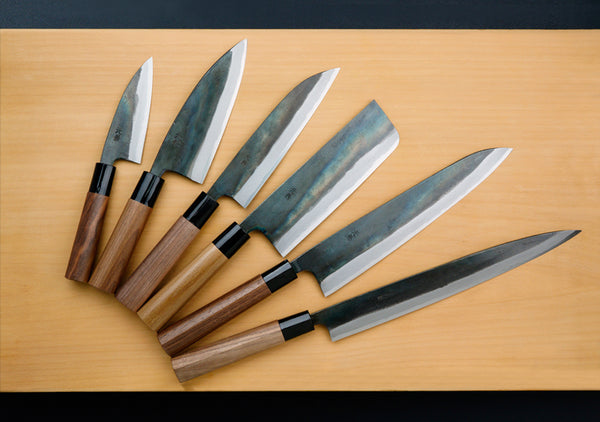"MOTOKANE" Kiritsuke Gyuto (Chef's Knife) Aogami Super Steel, White Oak Handle, 180mm
Sale price
Price
$4,897.00
Regular price
Unit price
per
★★★ Three HONMAMON Stars
Specification
■Size: Total length approx. 325mm
Blade length approx. 180mm Blade width approx. 45mm (base) Blade thickness approx. 3mm
Handle length approx. 130mm Width approx. 26mm (max) Thickness approx. 20mm
■Weight: Approx. 150g
■Material:
Blade: Blue paper super, Base metal: Soft iron,
Handle: Roasted white oak
Blade shape: Double-edged
Blade finish: Black finish
Handle shape: Octagonal
■ Manufacturing: Made in Japan
■ Use: Mainly for cutting meat
■Features:
This chef's knife is fire-forged by one of Tosa's leading knife smiths.
The cutting edge is made of Hitachi Yasugi's highest-grade steel, Aogami Super.
The thick steel is hammered and stretched during the fire-forging process, resulting in a dense structure.
Furthermore, the heat treatment is carried out with the utmost care to bring out the best in the characteristics of Aogami Super.
Although it is called a chef's knife, it is a versatile knife that can cut things other than meat and is called a chef's knife overseas. It has a longer and narrower blade
than a Santoku knife, making it easy to cut blocks of meat and de-stretch the tendons. In particular, Motokane's Kurouchi Gyuto knife has a more linear cutting edge than a regular chef's knife, making it easier to cut ingredients when pulling the knife.
The handle is made of white oak sawn from a log and naturally dried for 1-2 years, and the surface is seared to create an octagonal handle with the unique white oak pattern and a charred black gradation.
The finish is finished with lacquer, giving it a distinctive handle that is durable and resistant to chemicals.
This is an all-purpose knife recommended for professionals and cooking enthusiasts alike.
■About sharpness:
This knife is made of steel and has a varnish coating to prevent rust, so if you use it straight out of the box, it will not be as sharp as it should be.
The varnish will come off as you use it, but you can experience the original sharpness by sharpening it.
In addition, the blade is initially designed to be versatile so that it can be used by a wide range of people.
It is finished so that you can easily sharpen it to your liking, so
please sharpen it yourself and finish it to your desired sharpness.
■Note:
From forging to sharpening, we make our products by hand.
During the manufacturing process, scratches and peeling of the oxide coating may occur on the blade.
Therefore, we do not inspect for small scratches or peeling of the oxide coating. Since these
are free forged products, there may be differences in size for each product, and the blade may have slight distortions or bends.
Do not use a dishwasher or dryer.
Since these are steel knives, they will rust.
Since they are black-finished, rust is less noticeable, but please wipe off moisture frequently before use.
The blue paper super of the cutting blade is hard and is more difficult to sharpen than ordinary knives.
Please understand this before purchasing.
Item no. 1119417
What is kurouchi knife?

Kurouchi knives retain the scaly residue left from the forging process, meaning that the residue works as coating on the carbon steel to prevent from rust. The finish of Kurouch reduces reactivity on carbon steel knives, and give the knife a very characterful, rustic aesthetic prized by many knife enthusiasts. Kurouchi finishes varying widely in appearance, uniformity, and durability. Rarely do pictures do these finishes justice as they have a very complex look and feel to them. Of course, you need to sharpen the edge every time after using it even if the Kurouchi coating works for the sides of blade.
TOSA traditional skill “Free Forging”

TOSA cutlery started from 1621, over 400 years ago. Forge to finished need many steps, all steps just made from one blacksmith. Easy to control every part and keep it free style to forging, because that’s made by same craftsman. So, that’s why call this skill to “Free Forging”.

With the sound of a violent blow sparks, the way thick steel is transformed into a kitchen knife in the blink of an eye is truly craftsmanship. By hitting it many times with a hammer and stretching it, impurities come out; by making the structure “dense”, it becomes a knife with high hardness and stickiness.

You can see the marks of the hammer that was struck up with a hammer, it has the characteristic of being handmade by craftsmen and resistant to rust compared to polished finishing.

KUROUCHI forging with different color for every cutlery. TOSA “MOTOKANE” with additional process of kurouchi knives. On every knife have different color.
It could have some small scratches, flaws or bent, but they are the proof of handmade! The product seems rougher than machine made ones, but the quality is great, which you cannot feel with machine made one!
This knife isn’t using press process and solvent to make the pattern of knife, The final pattern and color of knife just depend on oxide film by random. So, the one and only knives.
So many situations can use that double bevel knife.

Double bevel knife with more tough of edge than single bevel, and easily to handle, good for Japanese food and western food.
Because free forging, can be easy to innovation.

The knife is consistently performed by a single craftsman, without being bound by the framework of the process, so can continue to improve and evolve.
This knife isn’t mass production. We are focus on the knife quality than productivity. You can feel the soul of craftsman. We recommend you use that for gift.

Import duties; taxes and charges are not included in the item price or shipping charges. These charges are the buyer's responsibility.




